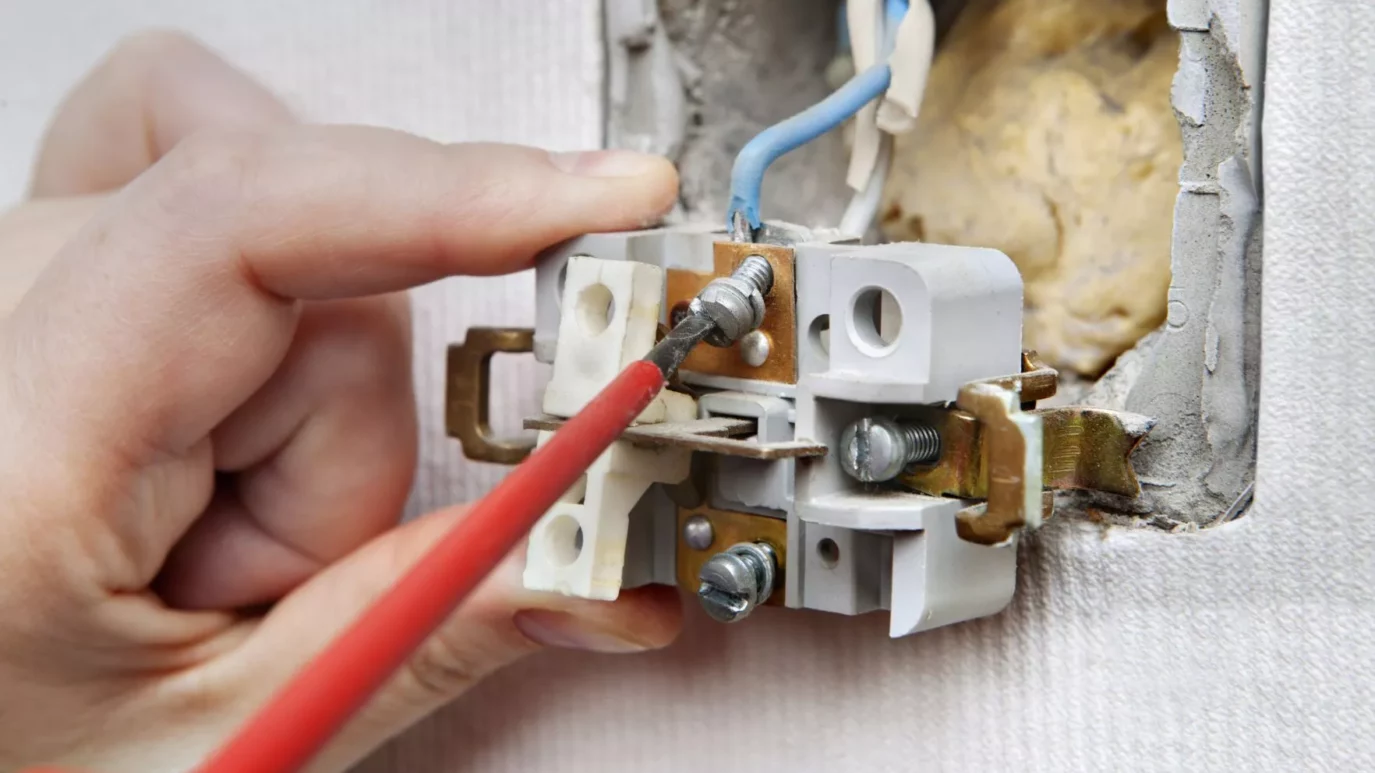Are you constantly resetting tripped breakers or squinting as your lights flicker? It’s not just an annoyance—it might be a cry for help from your home’s electrical system. In Colorado Springs, where your cozy evenings and home office depend on reliable power, recognizing these signals is crucial.
Dive into our guide, “5 Signs Your Home Needs An Electrical Update,” and uncover if these flickers are flukes or forewarnings of a deeper issue. Discover the critical signs—from buzzing outlets to outdated wiring—that indicate it’s time for an electrical upgrade. Stay ahead of the curve and keep your home safe and efficient.
Are Your Lights Flickering or Dimming Unexpectedly?
If your lights are consistently flickering or dimming, it could indicate that your electrical system is failing. Persistent issues, as opposed to a one-time event, often point to deeper electrical problems such as bad wiring or an overloaded circuit. So, how do you know if your electrical system is outdated? Ageing systems may fail to handle the current demands, and signs like flickering lights can be a warning before an electrical fire.
When lights flicker throughout your house, it’s often due to voltage fluctuations or loose wiring connections—both serious concerns. One-time flickering may occur due to a large appliance kicking on, drawing a significant amount of power momentarily. However, if the problem persists, this could be a sign of bad electrical wiring or a failing electrical system. For instance, outdated wiring may not provide a stable power supply, leading to flickering or dimming lights.
The correlation between these lighting issues and your overall electrical system cannot be overstated. Flickering lights could be the canary in the coal mine, signaling the need for a professional electrical assessment to prevent potential hazards.
Why Are Circuit Breakers Frequently Tripping in Your Home?
Circuit breakers are designed to protect your home by shutting off the flow of electricity when an overload is detected. Frequent circuit breaker trips are a common symptom of the need for an updated electrical panel. They often indicate that your home’s electrical system is experiencing an overload, which is a serious warning sign of potential danger.
When you notice a pattern of breaker trips, it’s typically because too many appliances or devices are drawing power from the same circuit, surpassing its safe capacity. This can happen if your home’s electrical system hasn’t been updated to accommodate modern power demands. For instance, older homes may not be equipped to handle the number of high-draw electronics and appliances used today.
If your circuit breaker trips more often than occasionally, it could be a sign your house needs rewiring. It’s a clear message that your electrical system is struggling and may require a professional assessment. Persistent breaker trips are a red flag that shouldn’t be ignored, as they can lead to more severe electrical system malfunctions. For the safety of your home and family, consider reaching out to a licensed electrician to evaluate and upgrade your electrical panel, ensuring it meets current standards and demand.
What Does It Mean When Outlets Show Physical Damage or Emit Strange Noises?
Physical damage to outlets, such as scorch marks, or strange noises like buzzing can be warning signs of outdated electrical systems or an impending electrical fire. When outlets show physical damage, it suggests that there may have been a short circuit or an issue with the wiring that could lead to serious hazards. Buzzing sounds from outlets often indicate loose connections or faulty wiring, which can cause arcing—a potential fire risk.
To diagnose and address these electrical hazards, it is essential to inspect the outlets for any visible damage and listen for unusual sounds. If you find charred electrical outlets or hear buzzing sounds, it is critical to take immediate action. These are signs that your electrical system may need an upgrade or repair. To ensure safety, it’s best to consult a professional electrician who can conduct a thorough inspection and provide solutions such as fixing hot outlets and ensuring your home meets current electrical codes. Ignoring these signs could put your home at a significant risk for electrical fires and other dangers.
Is Your Home Still Equipped With Outdated Wiring or Fuse Box?
Outdated electrical systems are often identified by materials and methods that are no longer considered safe or effective. How do you know if your electrical is outdated? Characteristics of outdated wiring include aluminum wiring, known for its higher risk of overheating and corrosion, and knob and tube wiring, which lacks a grounding path and is unsuitable for today’s electrical demands. Outdated fuse boxes may have issues like inadequate overload protection and the inability to accommodate modern appliances.
Old systems are no longer safe due to the evolution of electrical standards which now emphasize the need for systems capable of handling increased electrical loads with enhanced safety features. For example, outdated wiring dangers include a higher propensity for electrical fires and electric shock.
Updating to a modern electrical panel is crucial for safety and functionality. It involves replacing old wires and fuse boxes with a circuit breaker system that provides improved electrical distribution and protection against overloads. If you’re wondering how to know if your house needs rewiring, an inspection by a licensed electrician can determine if your system is antiquated and guide you through the process of updating it, including knob and tube wiring replacement.
How Does Your Electrical System Handle Modern Electrical Requirements?
How do I know if my electrical is outdated? Your electrical system might be outdated if it struggles to power modern appliances without tripping breakers, if outlets are ungrounded, or if it has not been updated to meet the latest safety codes. Modern electrical requirements demand that systems can handle a higher number of devices and more powerful appliances than in the past. To ensure safety and functionality, grounding system upgrades and increasing electrical capacity are often necessary.
Contemporary homes are filled with devices that require more power and often, a continuous supply of it. This includes high-definition televisions, home computers, HVAC systems, and kitchen appliances. To safely accommodate these devices, homes require electrical outlets that are grounded. Grounded outlets protect against electrical surges that can damage electronics and cause a fire hazard. Similarly, an electrical capacity increase is vital to prevent circuit overloads. Overloads can occur when the demand on an electrical circuit exceeds its capacity, leading to frequent tripping of circuit breakers or blown fuses.
To effectively measure your home’s electrical capacity against modern demands, a licensed electrician can perform an assessment. They will determine if your current system can meet your power needs or if you require an upgrade, such as upgrading home electrical outlets to grounded versions and enhancing your panel’s capacity to distribute electricity safely throughout your home.
Conclusion
In this article, we dove into the telling signs of electrical issues, such as persistent flickering lights and the frequent tripping of circuit breakers, which may indicate a deeper problem within your home’s electrical system. We’ve also discussed the dangers of ignoring physical damage or odd noises from outlets and highlighted the risks associated with outdated wiring and fuse boxes.
It’s clear that keeping pace with modern electrical requirements is not just about convenience; it’s a matter of safety. Homeowners must stay vigilant and proactive in assessing and updating their electrical systems to ensure they meet current standards and can handle today’s energy demands effectively.
Remember, these signs aren’t just quirks of an aging home—they’re warnings that call for immediate attention from professionals like Dr. Electric, committed to safeguarding your home and family.

